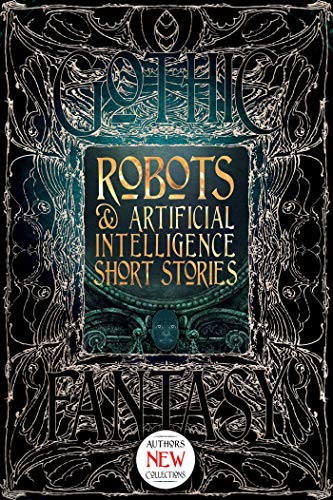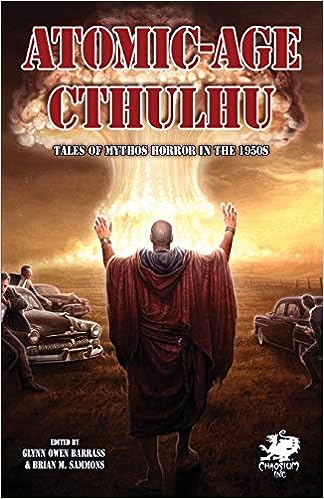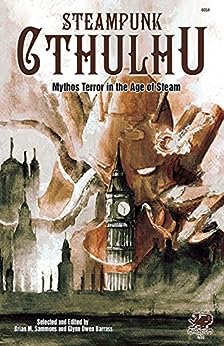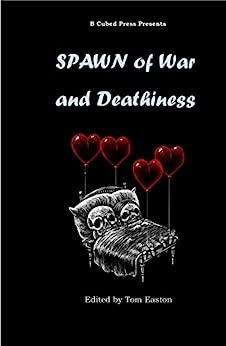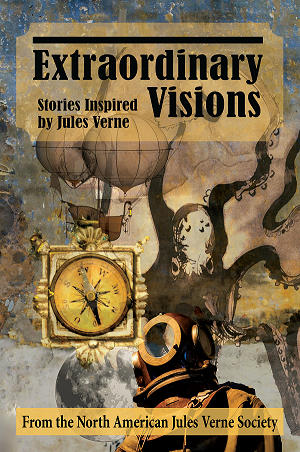For today’s interview we travel across the pond and talk with a British writer who shares my interests in science fiction, artificial intelligence, and classic SF literature. Christopher M. Geeson’s story “Tyranny Under the Sea” appears in Extraordinary Visions: Stories Inspired by Jules Verne.
Christopher M. Geeson has had several SF stories published, including AI-themed stories in the Flame Tree Press Robots and Artificial Intelligence anthology and The British Fantasy Society Journal—Autumn 2011. His most recent is a story for the collection, Extraordinary Visions: Stories Inspired by Jules Verne. Christopher has also had tales published in Atomic Age Cthulhu, Steampunk Cthulhu, Spawn of War and Deathiness, The Great Escape and Anthology: A Circa Works Collection, all of which are available on Amazon. Christopher works as a tour guide in York, and as a workshop leader in schools, libraries and museums in North Yorkshire, delivering creative workshops for children.
Right then. Let’s get to the interview straightaway.
Poseidon’s Scribe: How did you get started writing fiction?
Christopher M. Geeson: As a child, I made up stories for my toys to act out and my favorite lessons at school were when we were asked to write fiction. There was one lesson when the teacher was punishing people who couldn’t be quiet by making them write a ghost story – some punishment! Naturally, I got into trouble that day. I started writing stories in my spare time as a teenager. When I went to college and university to make films, I realized I was more interested in writing the scripts than in the technical aspects of film production. This led to me writing stories in prose again as an adult and joining various courses – when my writing reached the level where I could get it published.
P.S.: Who are some of your influences? What are a few of your favorite books?
C.M.G.: I love the SF worlds created by Philip K Dick and—more recently—Chris Beckett. They both often take society’s ills to the next level, in a futuristic setting, seen through the eyes of a recognizable flawed human. I’m also a fan of a good fantasy adventure, whether it’s epic in scope like The Lord of the Rings (my favorite book), or on a smaller scale, such as Treasure Island, or The Dark is Rising.
P.S.: You’ve written stories involving AI for the Robots and Artificial Intelligence anthology and The British Fantasy Society Journal. Tell us the premise for these stories and whether you’re optimistic or pessimistic about AI.
C.M.G.: I wrote “Punchbag”—which was published in The British Fantasy Society Journal—after getting the inspiration on a car journey. I pulled into a supermarket car park and spent the next hour writing the first draft. It’s a very pessimistic story about how humans will use AI for violence and it’s told from the point of view of the AI, who is the victim. It is ultra-violent, but it reflects what I fear humans are basically like. It’s been out for over a decade but I still think of it as one of my favorite pieces of writing and it’s still very relevant. I’d love to see it reprinted and reaching a bigger audience.
The next AI story I wrote (“The Perfect Reflection,” for the Robots and Artificial Intelligence) anthology is also pessimistic, continuing the theme of violence, and also told from an AI point of view. This time, the AI is an observer of human violence. The big question in the story is whether the AI can intervene or not. I’ve been the victim of a couple of random acts of violence and that has clearly fed into my work. I guess I’m more pessimistic about the future of the human race than I am about AI, but I think it’s all wrapped up in one, as humans keep on inventing ways of being nasty to others.
At the opposite end of the spectrum, I’m dismayed that AI is now being used to make music, art and literature. Although I’ve written stories from the point of view of AI, I have no desire to read a story written by one. I’m sure AI could improve our lives in some way – organization, medicine, information, dangerous physical work – but not by replacing creative people. I think this started a while ago though, when CGI started replacing stuntmen, costumes, model work, and special effects in movies. I doubt anyone can even find Pandora’s Box anymore, never mind put the lid back on it.
P.S.: Is there a common attribute that ties your fiction together (genre, character types, settings, themes) or are you a more eclectic author?
C.M.G.: I love thinking of ideas or playing about with “What ifs?”, so my writing is almost always SF or fantasy, as those are the types of stories I love reading, and the things which inspire me. I want to escape and be taken to other worlds by stories and do the same in my writing. A lot of my published work looks at the violent tendencies of humanity and ends up pretty dark. But I have a couple of unpublished children’s fantasy novels that are about adventure, friendship and unification between races. They’re a lot more optimistic and I’d love them to see the light of day sometime!
P.S.: Stories of yours have appeared in Atomic-Age Cthulhu and Steampunk Cthulhu: Mythos Terror in the Age of Steam. What do you find intriguing about the Cthulhu Mythos and how do your stories fit into it?
C.M.G.: I loved that sense of massive cosmic horror and how insignificant humanity was in Lovecraft’s stories. For the steampunk collection, I dived into the American Civil War era – a part of history that’s always fascinated me – and gave it a Mythos twist which shows how futile war is. For the Atomic-Age Cthulhu anthology, I wanted to tap into the paranoia of the McCarthy era, so I stuck a bunch of characters in a nuclear bunker with all their hidden secrets and violent instincts, and let events play out from there, against a Mythos background.
P.S.: If you could visit the fictional world of another author, where would you go and why?
C.M.G.: Over the years I’ve spent a lot of time imagining this sort of thing – and given it a lot more thought than it really justifies! When I was younger, these imaginary journeys were all about adventure and battles, but I’m really the sort of person who would just want a nice quiet visit somewhere, enjoying the sense of wonder. If I went to Middle Earth, I’d want to live in Rivendell or The Shire and spend my time telling stories and creating art and music, far removed from the dangerous world outside.
P.S.: The premise of the anthology Spawn of War and Deathiness sounds intriguing. Tell us about the poem you contributed to that book.
C.M.G.: The premise of my poem, “Motorway Maintenance,” is in its recurring line: “Death drives a black hearse on the motorway” and is about the grim reaper mopping up after road accidents, and meting out justice to those who cause them. I don’t do poetry very often, but I did enjoy playing about with the rules and forms of villanelles for that one.
P.S.: You run creative workshops for children in schools, libraries, and museums. What are these workshops like?
C.M.G.: My main job is as a tour guide in the beautiful historic city of York, and I meet lovely people everyday and tell them stories about York. I have a sideline in running creative activities for children and a big part of that is reusing junk for model-making and art. I love being creative and I want to share that and encourage young people to be creative too, in any way they can, at school or at home – or occasionally also in museums and other heritage sites, where I’ll probably be dressed as a Victorian or a Roman, something like that.
P.S.: Extraordinary Visions: Stories Inspired by Jules Verne contains your story, “Tyranny Under the Sea.” It’s an adventure tale involving Captain Nemo, an underwater city, and a daring escape. How did you come up with the idea for this story?
C.M.G.: 20,000 Leagues Under the Sea is probably my favorite Verne story, so I knew early on that my submission would be linked to that somehow. I’m also intrigued by the start of Mysterious Island and its Civil War-era setting, because I’ve always been interested in that part of history. (My first published writing was three articles for the American Civil War Society about movies featuring the conflict). From that starting point, it was relatively easy to find clues to Captain Nemo’s views on the war and which side he would aid if he got entangled in it. Things really took off when I got the idea to include 1860s submarines and an underwater city inspired by Fort Sumter, but the key to it all was when I got the idea to tell the story from a slave’s point of view – because that added the emotional heart of the story, as well as the reason for the events which unfold.
P.S.: What is your current work in progress? Would you mind telling us a little about it?
C.M.G.: I’m not a writer who can focus on just one idea at a time because I’m constantly getting ideas and inspiration for different stories and flitting between them. It can take me years from getting an idea, to writing it down, to doing rewrites, to submitting it somewhere and it seeing the light of day. I have a couple of children’s fantasy novels that I need to finish, as well as a couple of short stories that need redrafting. At the moment, I’m going back to one of those children’s fantasy novels and looking at fleshing it out a bit.
Poseidon’s Scribe: What advice can you offer aspiring writers?
Christopher M. Geeson: Well, I think of myself as an aspiring writer, too—I certainly have many aspirations for writing which I haven’t fulfilled yet! But my advice would be to write what you want, not what you think will bring you success or money. Spending time being creative is a reward in itself.
I’ve had a few short stories published and the thing for me which made the difference was going through lots of drafts and listening to constructive feedback. I think my most useful advice would be to find or form a small circle of writers who are at a similar stage and level to you, regardless of genre or style—most of my writing groups have only had one or two of us doing fantasy and SF, but the feedback was still tremendously helpful. Share each other’s work; give and take honest constructive feedback. Keep it professional, rather than close friends or family. Joining a writing course—or several courses—worked for me. I don’t have a writer’s group at the moment but I had small writing circles, like those I’ve mentioned, in the years when I progressed to being a published writer and I found the feedback and contact invaluable.
Poseidon’s Scribe: Thank you, Christopher. I love your suggestion for writers to join or form groups. That’s helped me, too.
Readers interested in Christopher M. Geeson’s work should explore his Amazon page.


